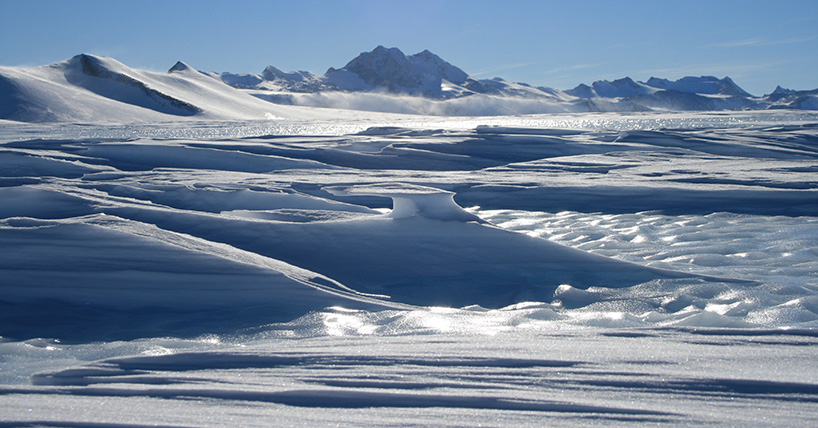UNESCO glacier loss report
Newcastle scientists contribute to UNESCO glacier loss report
Published on: 10 November 2025
Scientists from Newcastle University have contributed to a major new international report highlighting accelerating decline of glaciers and ice sheets and the consequences for people and the planet.
Glaciers and Ice Sheets in a Warming World: Impacts and Outcomes forms the UK’s scientific contribution to the United Nations International Year of Glaciers’ Preservation (IYGP 2025), led by UNESCO and the World Meteorological Organization.
Professor Bethan Davies and Dr Owen King, of the School of Geography, Politics and Sociology at Newcastle University, authored chapters detailing how the recession of mountain glaciers is accelerating worldwide. Professor Davies explored how glacier recession is accelerating from the Andes to Alaska, while Dr King explored six decades of mountain glacier loss from declassified spy satellite imagery.
Professor Davies, Professor of Glaciology, said: “Current climate action is inadequate to preserve our world’s glaciers. The International Year of Glacier Preservation and the research in this report shows how important glaciers are to societies across the world. Cutting carbon is essential to retain these glaciers for their critical water and ecosystem services.”
The landmark report has been coordinated by the UK National Commission (UKNC) for UNESCO and edited by Professor David J. Drewry, former Director of the British Antarctic Survey and Vice-Chair and Director for Natural Sciences at the UKNC.
It unites new findings from universities across the UK, including contributions from leading British scientists who work in partnership with international teams in glacier regions from the Andes and Himalayas to the Arctic and Antarctic.
It finds that since 2000, glaciers worldwide have lost more than 6,500 billion tonnes of ice, threatening the water supply of over a billion people and reducing the availability of water to countless mountain communities. This is an acceleration of 36 per cent in the past decade, with glacier water now driving roughly one-third of global sea-level rise, underscoring the urgency of limiting global warming to 1.5° C.
Dr Owen King, Research Associate, said: “Glacier recession is one of the most vivid visual indicators of the impact of climate change. Glaciers are receding and even disappearing completely in some of the planet’s highest mountain regions, the impacts of which will be felt by people living considerable distances downstream. Further ice loss is inevitable with sustained carbon emissions, but concerted action now can only reduce its impacts in decades to come.”

Hard hitting findings
The report finds that:
- Since 2000, glaciers have lost 6,542 billion tonnes of ice, more than 5 per cent of their total mass.
- Ice loss has accelerated by 36 per cent between 2012 and 2023 compared with 2000–2011.
- Glaciers now account for around one-third of global sea-level rise, exceeding the contributions from either Greenland or Antarctica.
- Regions such as the Caucasus and Central Europe have lost up to 40 per cent of their glacier mass
- Fifteen million people live under direct threat from glacial-lake outburst floods, while between one and two billion people depend on glacier-fed rivers for water, food and energy.
Professor David J. Drewry said: “The science is unequivocal: glaciers are retreating faster than ever recorded. Data and monitoring are vital, but only a rapid cut in global greenhouse-gas emissions can stem their long-term loss. In the meantime, adaptation planning has become critical.”
The report calls for urgent, coordinated global action to both mitigate further loss and adapt to the changes already locked in. It emphasises that:
- Rapid, sustained emission cuts remain the only route to stabilising temperatures and slowing glacier retreat.
- Adaptation planning must begin now for glacier-dependent communities, including the development of early-warning systems, flood preparedness, community relocation, water-resource modelling, and transboundary cooperation across shared river basins.
- Continuous monitoring and open data are critical. Many current satellite missions will end this decade without confirmed successors, risking a “blind spot” in our ability to track global changes.
- Finance and governance mechanisms must integrate glacier and snowpack indicators into the Global Goal on Adaptation and national climate plans under the Paris Agreement.
- Knowledge-sharing between mountain and polar regions, from the Andes to the Himalaya to the Arctic, should be expanded through UNESCO networks, Living Labs, and collaborative research programmes and drawing upon the lived experience of indigenous people.
Global action
UK scientists are working with partners across Europe, the Andes and the Himalayas to integrate glacier data into the UN Global Goal on Adaptation, strengthen resilience planning, and support UNESCO’s mission to build peace through science.
Newcastle University is proud to contribute to this global effort, reaffirming the UK’s leadership in climate and cryosphere research and its commitment to UNESCO’s mission to advance knowledge and sustainability worldwide.
The United Nations has designated 2025 as the International Year of Glaciers' Preservation to raise global awareness of glaciers’ critical role in ecosystems, economies and societies. UNESCO and the WMO are coordinating scientific and policy initiatives throughout 2025, culminating each year on World Day for Glaciers, 21 March.
Press release adapted with thanks to the UK National Commission (UKNC) for UNESCO



